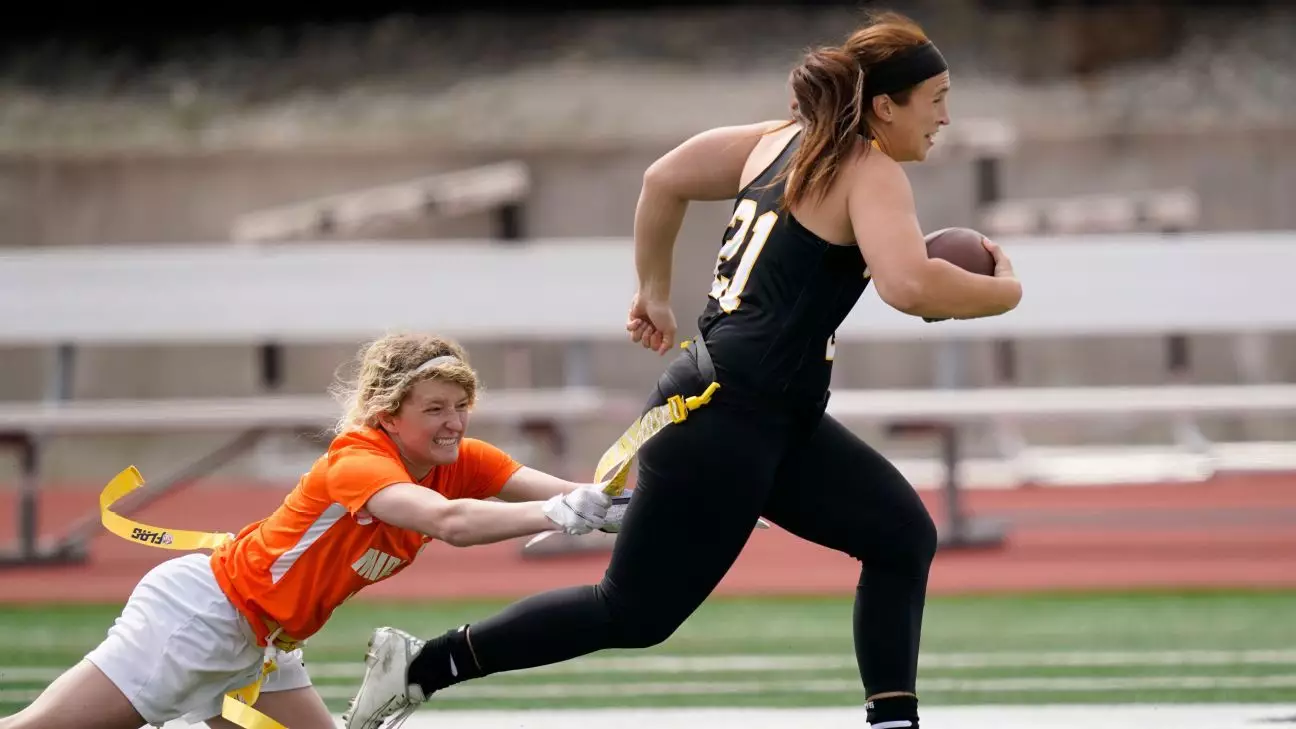As the world continues to prioritize inclusivity in sports, the Atlantic East Conference has taken a monumental step by launching its inaugural varsity women’s flag football season this spring. This initiative marks a significant moment as it positions the Atlantic East as the first NCAA conference to embrace women’s flag football as an official collegiate sport. This bold move fuels hopes that flag football will someday gain recognition as a championship sport within the NCAA, potentially transforming the landscape of women’s athletics.
Rebecca Mullen, the interim commissioner of the Division III Atlantic East Conference, expressed a profound sense of optimism regarding this development. In a recent interview, she noted, “To see it continue to grow and buy into that is really a unique opportunity.” With such foresight, the Atlantic East’s decision is not merely a symbol of growth but also a reflection of a broader movement towards expanding opportunities for female athletes.
The Atlantic East’s venture into women’s flag football has garnered substantial support from the NFL, which recognizes the importance of flag football in promoting the sport at grassroots levels. Through its flag football operator, RCX Sports, the NFL provided vital funding and assistance to ensure a successful launch for the conference. Their involvement underscores a commitment to growing the game, particularly among women, as the league aims to broaden its reach and influence.
The Philadelphia Eagles exemplify the NFL’s engagement in this endeavor. By hosting a media day to celebrate the launch of the Atlantic East’s season, the franchise highlights its dedication to empowering young female athletes. Julie Hirshey, the Eagles’ vice president of community relations, remarked on this landmark moment, stating, “Opportunities like this foster a more inclusive experience on the field of play and empower young female athletes of all ages and backgrounds.” This commitment to inclusivity is crucial in creating environments where female athletes can thrive.
The journey toward making women’s flag football a varsity sport began in 2024 when the Atlantic East initially introduced flag football as a club option. Now, with a full varsity framework in place, the inaugural season promises a structured competition, including regular-season play and playoffs. The excitement around the onset of this new era is palpable, with seven universities—Centenary University, Eastern University, Holy Family University, Immaculata University, Marymount University, Neumann University, and Penn State Schuykill—participating in this historic season.
While there are challenges ahead since Division III institutions do not provide athletic scholarships, innovative initiatives like the International Women’s Flag Football Scholarship Program—launched by the NFL in 2023—have emerged. This scholarship program aims to support international students who wish to study at U.S.-based schools that offer flag football as a varsity sport, effectively bridging some of the gaps in accessibility.
The NCAA has classified flag football under its Emerging Sports for Women program, a critical designation laying the groundwork for future championship recognition. To achieve this status, however, the sport must see a minimum of 40 schools support flag football at the varsity level. Given the substantial growth in participation—evidenced by the National Federation of High Schools reporting a 63% increase in female flag football players from 2019—it’s clear that the sport is gaining traction among young women.
As Mullen optimistically remarked, “I’m excited for the support and the growth across the board of other schools, and other conferences really buying in to giving women’s sports the big opportunity that it deserves.” With participation figures soaring to approximately 500,000 girls between the ages of 6 and 17 playing flag football in 2023, coupled with over 750,000 participants across the NFL’s flag football league nationwide, the sport’s potential is enormous.
The Atlantic East Conference’s introduction of varsity women’s flag football not only represents a vital step forward for women’s sports but also exemplifies a transformative wave sweeping across collegiate athletics. The backing of prominent organizations like the NFL bolsters this initiative and provides a roadmap for other conferences to follow suit. As awareness and participation continue to grow, women’s flag football could soon find its rightful place in the spotlight of NCAA sports, paving the way for future generations of female athletes to pursue their dreams in collegiate athletics.


Leave a Reply